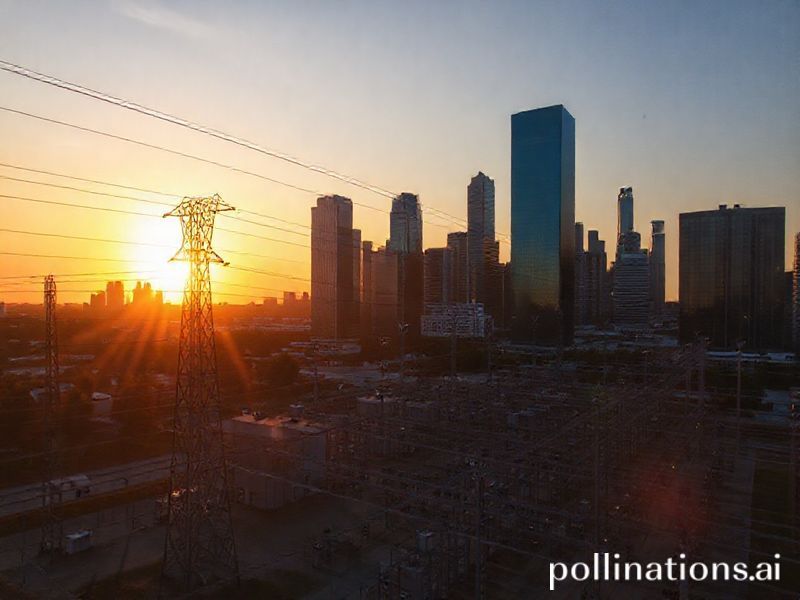centerpoint energy
CenterPoint Energy: Houston, We Have a Grid Problem (and It’s Contagious)
By the time the lights flickered out in Texas last February, the rest of the planet had already stopped pretending to be surprised. After all, we’ve spent the last decade watching power grids from South Africa to Siberia audition for the same tragicomedy: one moment you’re binge-watching a Nordic noir, the next you’re reenacting it by candlelight while your toes stage their own little Ice Age. CenterPoint Energy—Houston’s very own electron shepherd—has now joined this illustrious club of utilities that discover, usually mid-blizzard, that “winterization” is not a decorative font option.
For readers who insist on facts before the funeral humor: CenterPoint delivers juice to 2.8 million meter sockets along the upper Gulf Coast, a region that traditionally believes hypothermia is something that happens to other people, preferably Yankees. February’s Uri, a storm so polite it introduced itself by name before punching Texas in the trachea, knocked out 52% of CenterPoint’s customers. Somewhere in Houston, a refrigerated warehouse full of COVID-19 vaccines briefly became the world’s most expensive walk-in cooler. The subtext was not subtle: infrastructure designed for margarita weather does not pivot gracefully to martini weather.
To the international eye, the outage was less a “Texas thing” than the latest episode of a truly binge-worthy series titled “Why Grids Fail in Interesting Ways.” South Australians still swap PTSD flashbacks about their 2016 statewide blackout, triggered by a storm that rearranged pylons like dominoes. Indians remember July 2012, when the northern grid took a siesta so prolonged it could have qualified for Spanish citizenship. Even Germany—poster child of renewable virtue—has spent recent winters politely asking neighbors for spare kilowatts when the wind forgets to show up for work. The takeaway: the planet’s wires are fraying faster than our nerves.
CenterPoint’s particular brand of chaos offers a masterclass in geopolitical irony. The company has spent years touting its “smart grid” upgrades, presumably so your toaster can send emojis to a substation. Yet when Uri arrived, the grid demonstrated the intellectual wattage of a burnt-out bulb. Meanwhile, Texans—world-champion libertarians—discovered the hard way that electricity markets optimized for price signals don’t actually keep the lights on; they just auction off the darkness. The spectacle of citizens crowd-funding hotel rooms with functioning heat turned the invisible hand of the market into a very visible middle finger.
Globally, this raises an awkward question: what happens when every region decides to pursue its own bespoke energy policy like a teenager curating a Spotify playlist? Europe is busy banning Russian electrons while simultaneously wondering why electrons can’t be reasoned with like wine tariffs. China is building ultra-high-voltage lines that could power a medium-sized moon colony, but still loses enough coal to corruption each year to keep Australia’s economy humming. India is erecting solar parks the size of Luxembourg while quietly expanding coal plants the size of Luxembourg plus Belgium. In this planetary game of infrastructure Jenga, CenterPoint’s wobble is just another block threatening the tower.
The broader significance? Simple: we’ve entered the age where the most strategic resource is not oil, lithium, or even Twitter followers—it is sheer, boring reliability. The nations that master the art of keeping electrons obedient will dominate the 21st century the way nations with navies dominated the 19th. The ones that don’t will become cautionary memes, their blackouts screen-capped and captioned by teenagers who’ve never known dial-up but instantly recognize systemic incompetence.
CenterPoint, for its part, has promised to winterize its kit before the next ice age, or at least before the next election cycle—whichever comes first. The rest of us can only watch, wrapped in blankets woven from the fiber optic cables we once believed would save us. And when the lights finally come back on, we’ll do what humans always do: forget, upgrade, and schedule the next preventable disaster for a season when we least expect it. Spoiler alert: it’ll probably be summer.







